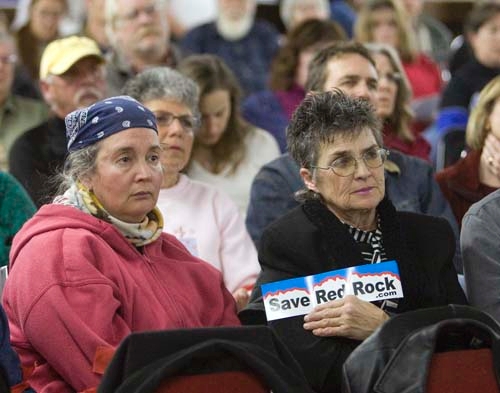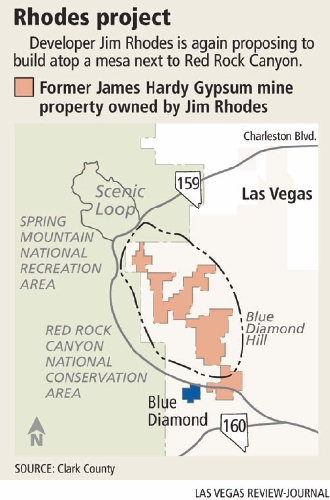Residents challenge Rhodes plan anew
They gathered Wednesday in a meeting hall not far from a mesa where a developer wants to build houses, shops and perhaps a school that would overlook a popular conservation area.
About 200 people packed the Blue Diamond community center to show their opposition to Jim Rhodes' effort to build more houses than county rules now allow on a 2,400-acre site across from the Red Rock Canyon National Conservation Area.
Most who attended reside near Red Rock. Most were upset about Rhodes returning with yet-to-be-defined development plans for Blue Diamond Hill five years after his earlier attempt fizzled.
They feared that if more intense development is allowed on the former mining site, it would diminish their piece of paradise and Red Rock's scenic beauty.
"This piece of property is in Red Rock Canyon," said Heather Fisher, a Blue Diamond resident. "Red Rock is outside the city, and we want to keep it that way."
Residents grilled Clark County Deputy District Attorney Rob Warhola about a proposed agreement between Rhodes and the county. Commissioners will review the proposal on April 21.
Rhodes and the county are set to face off in federal court in May.
Warhola explained the advantages of making the deal, and the risks of wrangling with Rhodes in court.
But attendees weren't swayed.
The local citizens' advisory council asked those who were against the deal to raise their hands. Virtually everyone in the audience did so.
During the meeting, residents were mostly civil, though emotions heated up a few times.
Dave Kruleski asked Warhola whether he was representing the people. Warhola said he represented the county.
"We are the county!" Kruleski shot back. "Every way you look at it ... it will put a burden on taxpayers. Besides which, it will be aesthetically horrible."
Kruleski's combative tone prompted Evan Blythin, an advisory council member, to ask folks not to attack Warhola.
"We're going to be nice tonight," Blythin said. "Save that for the County Commission."
"Yeah! Bring them on!" called out an audience member.
If the county approves the compromise, Rhodes would drop a 5-year-old lawsuit that claims the county acted unconstitutionally by barring him from applying to build housing denser than one house per two acres.
Rhodes would have to apply for 700-acres at a time under "major projects," which has a more stringent review process, Warhola said. And the county would retain its authority to reject his plans.
"We're simply giving him the right to apply," Warhola said.
Rhodes also agreed to build the main road into the subdivision from the east, rather than from Route 159, which loops through Red Rock.
Last year, a federal judge ruled in Rhodes' favor by striking down a state law that mirrored the county law, increasing the odds the county would lose this battle, Warhola said.
Warhola told the audience that if the county loses in court, it could be on the hook for $1 million in legal costs, and the current restrictions on the land could be dissolved. The county also would have a strike against it, giving Rhodes more leverage when applying for land-use changes, he said.
Pauline Van Betten, a resident, said it's crucial that Rhodes adhere to the design standards in the "overlay district" that encompasses his land. The codes bar reflective rooftops, neon, billboards and roads through the conservation area, and call for putting houses behind ridges so they don't visually intrude on Red Rock, she said.
"I think we would have a compromise everyone can live with," Van Betten said.
Warhola said that all the standards would remain in place under the agreement with Rhodes.
Rhodes' opponents have criticized Commissioner Susan Brager about why she put the proposed agreement on the March 17 meeting agenda without first meeting with those who would be affected.
At the meeting, Brager said she would let Warhola answer questions and would listen to people's comments.
Warhola said it was his decision to put the proposal on the agenda because he thinks it's a reasonable offer.
Rhodes would be limited to developing 1,700 acres and none of the land adjacent to the conservation area, Warhola said. But if he wins in court, he could push to build on the entire 2,400 acres.
Lisa Mayo-DeRiso, a neighborhood advocate, asked how much the community's interest would be taken into consideration with a major project.
"Has there ever been a major project in Clark County that's been denied?" she asked, drawing loud applause.
Contact reporter Scott Wyland at swyland@reviewjournal.com or 702-455-4519.


















